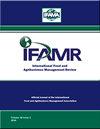The interaction relationships among agricultural certification labels or brands: evidence from Chinese consumer preference for fresh produce
IF 1.5
4区 经济学
Q3 AGRICULTURAL ECONOMICS & POLICY
International Food and Agribusiness Management Review
Pub Date : 2021-12-16
DOI:10.22434/ifamr2021.0048
引用次数: 4
Abstract
China uses a multilevel agricultural certification system; however, its implications are not well understood. In this study, we used tomatoes as an example in a series of Becker-DeGroot-Marschak auction experiments to determine consumers’ willingness to pay (WTP) toward three safety certification labels and two kinds of brands. Then, based on the auction experiment results, we designed a menu-based choice experiment to assess the interaction relationships between the safety certification labels and brands. The results showed that consumers were generally willing to pay a premium for tomatoes with safety-certified labels (especially for organic labels) and brands (especially for the enterprise brand). Providing consumers with additional information regarding the certification remarkably improved their WTP for tomatoes with organic and green labels. The menu-based choice experiment suggested that the organic and green labels were found to be substitutes. In addition, organic and green labels could not substitute the enterprise brand, whereas the converse of this relationship was true. Finally, a mutual substitution relationship was observed between hazard-free label and enterprise brand. Our research enables producers to consider the interaction between certification strategies and brand strategies. Therefore, marketers and policymakers should take steps to promote and expand consumers’ knowledge on certification, as it could benefit the development of certified food.农产品认证标签或品牌之间的互动关系:来自中国消费者对新鲜农产品偏好的证据
中国实行多层次农业认证制度;然而,它的含义并没有得到很好的理解。在本研究中,我们以西红柿为例,通过一系列的Becker-DeGroot-Marschak拍卖实验来确定消费者对三种安全认证标签和两种品牌的支付意愿(WTP)。然后,在拍卖实验结果的基础上,我们设计了一个基于菜单的选择实验来评估安全认证标签与品牌之间的交互关系。结果显示,消费者普遍愿意为带有安全认证标签(特别是有机标签)和品牌(特别是企业品牌)的西红柿支付溢价。向消费者提供有关认证的额外信息,显著提高了他们对带有有机和绿色标签的西红柿的WTP。基于菜单的选择实验表明,有机和绿色标签被发现是替代品。此外,有机和绿色标签不能替代企业品牌,反之亦然。最后,无害化标签与企业品牌之间存在相互替代关系。我们的研究使生产者能够考虑认证策略和品牌策略之间的相互作用。因此,营销人员和决策者应该采取措施,促进和扩大消费者对认证的知识,因为这可能有利于认证食品的发展。
本文章由计算机程序翻译,如有差异,请以英文原文为准。
求助全文
约1分钟内获得全文
求助全文
来源期刊

International Food and Agribusiness Management Review
AGRICULTURAL ECONOMICS & POLICY-
CiteScore
2.90
自引率
0.00%
发文量
0
审稿时长
>12 weeks
期刊介绍:
The IFAMR is an internationally recognized catalyst for discussion and inquiry on issues related to the global food and agribusiness system. The journal provides an intellectual meeting place for industry executives, managers, scholars and practitioners interested in the effective management of agribusiness firms and organizations.
IFAMR publishes high quality, peer reviewed, scholarly articles on topics related to the practice of management in the food and agribusiness industry. The Journal provides managers, researchers and teachers a forum where they can publish and acquire research results, new ideas, applications of new knowledge, and discussions of issues important to the worldwide food and agribusiness system. The Review is published electronically on this website.
The core values of the Review are as follows: excellent academic contributions; fast, thorough, and detailed peer reviews; building human capital through the development of good writing skills in scholars and students; broad international representation among authors, editors, and reviewers; a showcase for IFAMA’s unique industry-scholar relationship, and a facilitator of international debate, networking, and research in agribusiness.
The Review welcomes scholarly articles on business, public policy, law and education pertaining to the global food system. Articles may be applied or theoretical, but must relevant to managers or management scholars studies, industry interviews, and book reviews are also welcome.
 求助内容:
求助内容: 应助结果提醒方式:
应助结果提醒方式:


